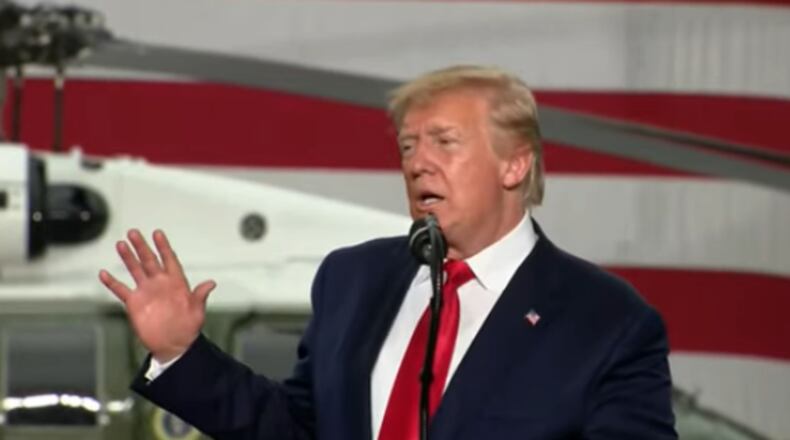The President returned to the White House just before sunset on Sunday evening, after a trip which took him to the G20 Summit in Japan, and then to South Korea, with the surprise border meeting involving Kim Jong Un.
He took no questions from reporters waiting outside the White House.
The moment President Trump meets Chairman Kim at the DMZ and becomes the first sitting President to enter North Korea: pic.twitter.com/VwqGAEmmxz
— The White House (@WhiteHouse) June 30, 2019
What's changed as a result of the President's quick visit into North Korea?
1. North Korea agrees to resume nuclear negotiations.
After the failure of the Hanoi summit earlier this year between the American and North Korean leaders, little progress had been made in recent months to simply get talks going again between the two nations - now those talks will resume. That's certainly a favorable point for the President, who has tried repeatedly to publicly flatter Kim Jong Un about the advantages of an agreement with the West, as the White House argues that Mr. Trump has calmed a situation which back in Mr. Trump's first year was seemingly going out of control, as North Korea tested long range missiles, and the President tweeted about 'Rocket Man.'
Leaving South Korea after a wonderful meeting with Chairman Kim Jong Un. Stood on the soil of North Korea, an important statement for all, and a great honor!
— Donald J. Trump (@realDonaldTrump) June 30, 2019
2. Is Kim really ready to give up anything in talks?
Even with the positive P.R. scene of President Trump going into North Korea - the salient question is simply, what is next? Now that the President has visited North Korea, is there going to be any kind of real progress in terms of reining in Kim Jong Un's nuclear weapons program? That was the stated goal of the Trump Administration in the past for the North - fully verifiable denuclearization. Kim Jong Un wants economic sanctions lifted before he does anything to tear down his nuclear program - and the definition of that "anything" is unclear in terms of what Pyongyang will negotiate. Will the U.S. get anything in return in the interim?
If we’re going to legitimize North Korea as a Nuke State, can we at least get something for it?
— Van Jackson (@WonkVJ) June 30, 2019
—Verifiable nuke freeze
—Cap and rollback commitments
—Kim promises intl standards for human rights
—No tactical nukes
—Cut to troop #s in the South
Anything????
3. But what if the North Koreans won't give in on nukes?
Yes, the two sides are going back to the negotiating table. But what if Kim Jong Un won't budge, and won't agree to denuclearize? What then? Remember, there were news reports that Kim had purged his negotiating team a few months back, after the Hanoi Summit debacle. Critics rightfully point out that more than 12 months after the first Trump-Kim summit in Singapore, nothing has really changed. Yes, there are letters going back and forth between the President and Kim. Yes, there was the DMZ meeting. But the North has not done anything concrete to back away from further development of its nuclear arsenal, and has in fact been creating new missiles and new nuclear sites.
Every single nuclear weapon and missile that can carry a nuclear weapon to American cities that was in North Korea at the start of the Trump presidency is still there.
— Rebeccah Heinrichs (@RLHeinrichs) June 30, 2019
4. Lawmakers praise Kim meeting, but want results.
As Republican Party leaders applauded the President for his efforts to push ahead with negotiations involving Kim Jong Un, there were loud complaints from Democrats, and also a quiet warning from some GOP lawmakers, which echoed some of the points being made by Democrats in Congress. "We shouldn't waste our time negotiating with dictators unless we're confident we can get a deal," said Sen. Rick Scott (R-FL), one of the President's closer allies in the Congress. The reason a U.S. President never went to North Korea before was that it would be seen as a public relations coup for the Pyongyang regime - while the U.S. gets nothing in return for that scene. That's where we are now. Could that change - obviously, the answer is yes. Will it change? That is an answer which is not as clear.
I also applaud @realDonaldTrump’s efforts to get a deal with North Korea. But we need to see action.
— Rick Scott (@SenRickScott) June 30, 2019
We need to make progress to denuclearize the region & we need to do it soon. We shouldn’t waste our time negotiating with dictators unless we’re confident we can get a deal.(3/3)
About the Author
